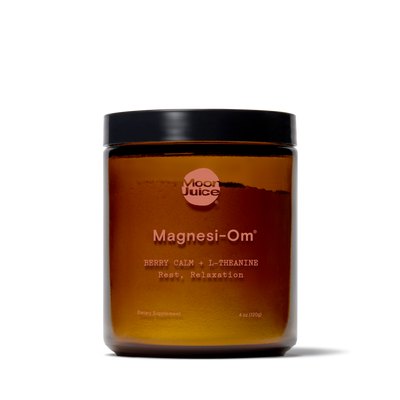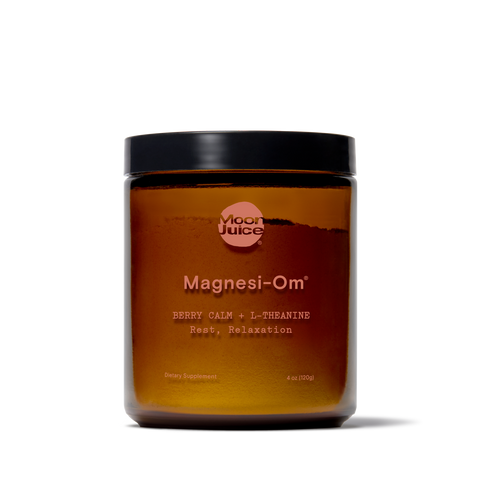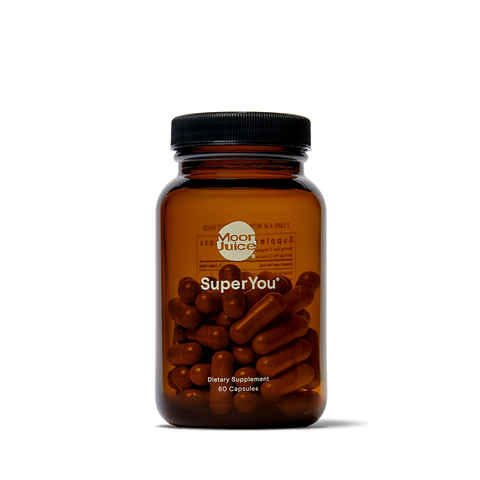Nearly 70 million Americans experience sleep disorders today - so if you find yourself having difficulty falling asleep or tossing and turning in the middle of the night, you’re not alone. The good news is, there are several sleep aids and supplements out there that can help you achieve deeper, better quality rest-L‑theanine is one of our favorites.
L‑theanine is an amino acid mostly found in teas and mushrooms—if you’re a fan of these foods, you may have consumed L‑theanine before without knowing it. However, L‑theanine supplements are being increasingly recognized for their ability to protect your brain cells and boost cognitive function. But can a boost in L‑theanine also help you sleep?
Studies have found that by increasing the levels of “peaceful” neurochemicals in your brain, L‑theanine may lower anxiety and raise focus. Most importantly, it may help you fall asleep and stay asleep because of how it interacts with certain brain processes that play a key role in healthy sleep.
How L-Theanine Works to Aid Sleep
Research on how L‑theanine and sleep may work together is just beginning, but recent studies show that L‑theanine may promote sleep by:
- Boosting GABA levels
- Enhancing alpha brain waves
- Lowering excitation of brain chemicals and hormones
Let’s take a closer look at each sleep-promoting mechanism.
#1 Boosts Levels of GABA
A study published in 2019 suggests that one of the ways L-theanine may promote sleep is by boosting GABA levels. GABA, Also known as gamma-aminobutyric acid, is an amino acid responsible for blocking chemical messengers from reaching certain nerve cells in your brain. These chemical messengers include chemicals and hormones that often increase the levels of activity in your brain. When your brain is experiencing increased activity, it can cause you to feel more awake—including at times you’d probably rather be sleeping. So by blocking these chemical messengers from your brain, L-theanine can help you feel relaxed when you’re trying to sleep.
One of the chemical messengers GABA blocks the most is called glutamate. If you have high levels of GABA in your brain, you likely also have low glutamate levels. Scientists believe that this combination of high levels of GABA and low levels of glutamate also helps to limit activity in your brain, which, in turn, helps you achieve better sleep.
While many people feel L‑theanine’s sleep-inducing benefits on their own, studies suggest that taking GABA supplements at the same time can amplify its effects and promote even more restful sleep.
#2 Enhances Alpha Brain Waves
Your brain is like a telephone wire, capable of receiving and sending messages through electrical signals. Scientists call these electrical signals brain waves. While some brain waves are responsible for focus and decision-making, other brain waves are responsible for relaxation and meditation. Scientists call the latter alpha waves.
One study published in 2008 suggests that L-theanine may increase your alpha brain waves and help you feel more relaxed. More relaxation can, in turn, can lead to more sleep. In short, alpha brain waves may help:
- Increase relaxation
- Decrease anxiety
- Boost creativity
- Decrease depression
#3 Lowers Excitation Brain Chemicals and Hormones
The chemicals and hormones in your brain and body do the important work of sending signals and communicating messages—but these aren’t always helpful when it’s time to sleep. Evidence suggests that taking L-theanine for sleep may help lower the chemicals and hormones that stimulate your brain. By lowering these brain chemicals and hormones, L‑theanine may help decrease:
- Stress and anxiety – Not shockingly, high levels of stress and anxiety can keep you awake. That’s because stress and anxiety stimulate your brain, producing “fight or flight” response symptoms, which prevents you from sleeping.
L-theanine may also boost chemicals and hormones that help calm your brain. Alongside GABA, these hormones include:
- Serotonin – Serotonin is a chemical messenger responsible for balancing mood and may help your body get ready for sleep and, even better, stay asleep. As a result, increasing serotonin levels may help you get more rest.
- Dopamine – This chemical messenger is responsible for feelings of pleasure and happiness and may help you fall asleep by decreasing wakefulness. A 2012 study suggested that having less dopamine could cause you to feel more awake—meaning that raising your dopamine levels could help you drift off easier.
How Much L‑Theanine Do You Take for Sleep?
Even small amounts of L‑theanine may help you sleep better. A study published in 2019 illustrated that as little as 20 to 30 mg of L‑theanine can help you fall asleep faster.
But to experience L-theanine’s full benefits, you may want to take the clinically-recommended dose of 200 mg before bedtime. You can consume L‑theanine through several sources, including:
- White tea – High in antioxidants and low in caffeine, white tea packs 6.26 mg of L‑theanine per gram of tea.
- Black tea – Black tea is noted for its high caffeine concentration, so it may not be the best option before bed. However, black tea also contains 5.13 mg of L‑theanine per gram of tea.
- Green tea – Incredibly high in antioxidants, green tea contains 6.56 mg of L-theanine per gram of tea. Also contains caffeine, so best to avoid when you’re getting ready to sleep.
- Mushrooms – Some mushrooms may contain high levels of L‑theanine. These mushrooms mainly consist of fungi belonging to the Boletales group, like Porcini.
Supplements and powders containing L-theanine are additional sources of this powerful amino acid. These options often offer a more potent dose, allowing you to take a concentrated form of L‑theanine when you need sleep support the most.
When to Take L‑Theanine for Sleep
The best time to take L‑theanine depends on the reason you’re using it. If you mainly want to relieve anxiety and feel more relaxed, you can take L‑theanine at any time during the day. However, if you’re specifically using L‑theanine for sleeping, it’s best to take it right before bed.
For sleep support, you also want to ensure the form of L‑theanine you take doesn’t come with any caffeine, like some of the teas we mentioned above. Research shows that caffeine can keep you awake, so combining L‑theanine and caffeine may not be the best option.
Potential Side Effects
For most people, L‑theanine will have little to no side effects. You might experience some mild side effects if you take more than the recommended dose. These side effects can include:
- Nausea
- Headache
- Anxiety
These side effects appear to be mostly correlated with high caffeine intake from consuming other substances, like teas, that contain L‑theanine — not L‑theanine itself.
Research shows that it’s also safe to take L‑theanine as a long-term sleep supplement, especially if you stick to the recommended dose. That said, you might want to be more careful when taking L‑theanine for long periods if you:
- Are pregnant or breastfeeding – More research needs to be done to determine the health risks of taking L‑theanine while pregnant or breastfeeding. If you’re pregnant or breastfeeding, it’s a good idea to talk to your healthcare provider before starting an L-theanine regimen.
- Are on blood pressure medication – A study published in 2012 suggested that L‑theanine can lower blood pressure. If you also take medications to lower your blood pressure, be sure to talk to your doctor about L‑theanine to avoid any health risks of combining the two, as you could end up with blood pressure that’s too low.
L-Theanine vs Melatonin
Melatonin is another common supplement that can help you fall asleep. Though it has a similar purpose as L‑theanine, these two supplements work in very different ways.
The most important distinctions include:
- How they work – L‑theanine may help you sleep by boosting GABA, enhancing alpha brain waves, and decreasing levels of stimulating chemicals and hormones. Melatonin specifically targets the sleep cycle by helping to regulate your body’s circadian rhythm.
- Side effects – L‑theanine has no known side effects outside of the headaches, nausea, and anxiety associated with the teas that contain L‑theanine. Melatonin can increase grogginess the next day since it directly impacts the sleep-wake cycle.
- Sources – Outside of supplements, L‑theanine is relatively rare. You’ll mostly find this amino acid in some teas and mushrooms. Meanwhile, Melatonin is a hormone your body produces naturally. Many foods, such as oats, rice, oranges, and eggs, can increase your body’s Melatonin production.
- Who should take them – While L‑theanine can benefit most people regardless of lifestyle, Melatonin may be especially beneficial for certain groups of people. If you’re a third-shift worker, suffering from jet lag, or dealing with other disruptions to your sleep cycle, Melatonin might help you get back on track.
- How long you can take them – Melatonin may be a safe way to temporarily get your sleep cycle back on track, but some scientists caution against long-term use. We don’t yet know enough about the long-term effects of melatonin supplementation on the body, and some people have reported negative effects. Meanwhile, existing studies on long-term L‑theanine supplementation have shown that it can safely be taken routinely.

Additional Benefits of L‑Theanine
Aside from helping promote sleep, L‑theanine also provides benefits for your brain, heart, and metabolism. These benefits can include:
- Anti-inflammatory properties – Research indicates that L‑theanine may play a role in reducing inflammation in your body by limiting inflammatory pathways.
- Metabolic regulation – Evidence shows that L‑theanine may also play an important role in regulating your metabolism.
L‑theanine may also support immunological, reproductive, and liver health.
How to Include L‑Theanine in Your Bedtime Routine
Taking L‑theanine for sleep can provide many benefits outside of deep rest. If you’re taking L‑theanine for sleep, you’ll likely also want to limit your caffeine intake, so avoid sources of L‑theanine - like black and green teas - that also contain caffeine.
Many L‑theanine-containing supplements can help you achieve peaceful sleep without adding additional caffeine to your diet. As discussed above, L‑theanine can also provide additional benefits—from immune system support to heart health - when taken over time.
Magnesi‑Om® is our daily Magnesium supplement for relaxation, sleep, and regularity. It combines 3 bioavailable forms of Magnesium with L‑Theanine for added calm and brain health benefits. Mix 1 tsp in water every night or when you need to chill.












